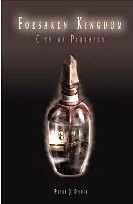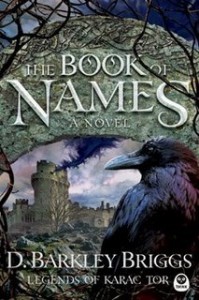Forsaken Kingdom: City of Prophecy by Peter J. Dudek
Carnation City Press 2008, 311 pages.
Worldview: Christian
The kingdom of Arvalast, which has a medieval flavor to it, has a seemingly absent king. It was once a kingdom of light, but the forces of darkness have gradually overtaken it. When the story opens, the dark forces are targeting the remnant who oppose them.
Woodend is a town at the north side of Arvalast where many of the remaining faithful live. They carry phials of light called illumina, which call to mind the phial of Galadriel carried by Frodo in Lord of the Rings. The illumina serve as means to communicate with the king, who influences events based on that communication. Because times are dark and the faithful are being drawn away, many of the phials emit only a bit of light and seem worthless. But that’s really because the heart of the bearer has turned away from the king.
But there is a (forgotten) prophecy that three servants of the king will arise, and that after them three warriors of the light will follow.
One of the main characters in the fight against dark forces is the governor of Woodend, Willardon, who is a weak-willed fence-sitter at the beginning of the story. Another is Tarin, a teenage boy who has Asperger’s Syndrome traits (doesn’t like to be touched, is overly fearful and avoids company of others). Tarin likes to eavesdrop.
The footsoldiers in the army of evil are physical beings (orc-like?) and also spiritual beings. Tarin has a “gift” and can see the spiritual beings, smoke-like wraiths, who have sharp teeth and weird eyes and who pass through walls. The orc-like beings are gathering in the forest for an assault on Woodend. In fact, the wraiths have already entered and are poisoning the hearts of many of the people of Woodend.
As the story unfolds, Willardon remembers to call on the power of the king. With this help, he is able to defeat the evil wraiths using light. Meanwhile, Tarin and a friend find themselves lost in the woods, and Tarin must put his trust in the king in order to save himself and his friend.
The king isn’t ignoring the situation. He sends his helper, Gildareth, to help the people of Woodend stand fast.
The book ends abruptly. It’s clearly not intended to be an ending, but instead leaves the reader in suspense waiting for the next installment.
—-
My opinion: The characters are well-drawn and consistent. The dialogue reveals their idiosyncrasies well. Dudek has a gift for this.
I did have some trouble bonding with Tarin, who starts the book as a main character. He’s doing stuff I don’t approve of, such as eavesdropping. Now, I do have two kids with Asperger’s, so I see some of their traits in him. Whether the author intended that, I don’t know. If so, this is undoubtedly the first novel starring an Aspie! As the story goes on, it gets easier to like Tarin. That’s a good thing.
Another thing I had trouble with was the number of situations that I found to be frightening. This book might be better categorized as Christian horror. There are just too many really scary beings in it for my taste. But then, I have never liked horror.
The best thing about this book is the personal relationship that characters have with the king. They ask for help (using the illumina) and they get help. When they stop being self-centered, communication using the illumina improves. This models the Christian walk in a way I haven’t seen yet in Christian fantasy.
Dudek, a homeschool graduate, spent five years on this work. The book is self-published but nevertheless reasonably well-polished. Dudek says he is a big-time Tolkien fan. I can see plenty of similarities to the Lord of the Rings in his book, including the way the first book ends: abruptly.
However, a personal relationship with the king is something Tolkien didn’t attempt. I’m really glad Dudek did. It forms the backbone of a great story. –Phyllis Wheeler
Peter Dudek’s Web site: http://www.forsakenkingdom.net
If you want to buy this book, help pay the expenses of this Web site and buy it from this link:


